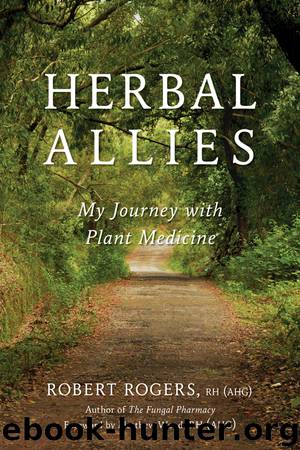Herbal Allies by Robert Rogers

Author:Robert Rogers
Language: eng
Format: epub
ISBN: 9781623171407
Publisher: North Atlantic Books
Published: 2017-03-30T04:00:00+00:00
Not being able to find any tripe de roche, we drank an infusion of Labrador tea and ate a few morsels of burnt leather for supper.
—John Franklin
Labrador tea patch
I first became acquainted with northern Labrador tea while living on the south shore of Lesser Slave Lake. I was told the leaves made a good herbal tea, so I gathered a few leaves, dried them, and steeped a hot beverage. It was okay. The next week, I visited a Cree neighbor and sampled some marsh tea slowly decocting on the back of his woodstove. There was quite a difference in both the flavor and potency.
At the time, my good friend Terry Anderson and I had started a herb tea company called Home Grown Products. We dried some Labrador tea leaves and tried to market the packaged product at the local farmer’s market. We were both working for the Company of Young Canadians at the time, similar to the Peace Corps in the United States. One of our initiatives was to plan and implement a farmer’s market in High Prairie, which I believe is running to this day, some forty years later. The Labrador tea was a hard sell, particularly as the local people could go into their backyards and pick it for themselves. Wild mint (Mentha canadensis) was also readily available, but the dried leaf tea sold well for us.
Ledum is derived from the Greek ledos, meaning “woolly robe,” in reference to the underleaf; or from ledon, which was the Greek word for Cistus or rock rose. It may derive from the Latin laedere, meaning “hurt,” in reference to its intense scent, causing headaches. This is less likely. Palustre means “of the marshes.” The name Labrador may originate from the 1500s, when the Portuguese are said to have touched down in eastern Canada and loaded a ship with enslaved Inuit people. Lavradores means “worker” or “slave.” An early Italian map of Newfoundland is named Terre del Laboratore, or Land of the Worker. João Fernandes Lavrador explored the area after explorer John Cabot in 1498.
My great-great-great grandfather spent two years on an English ship cod fishing off the Grand Banks of Newfoundland. After this time of servitude he was given a small piece of land on which to build a house in the now deserted outport of Grole. Maybe that explains why I enjoy cod so much. Early Acadians heard “Labrador” as la bras d’or, meaning “golden arm.” This was attached to the beautiful Bras d’Or Lake of Cape Breton.
In 1996, the American Horticultural Association folded Ledum into the genus Rhododendron. This is based in part on similar-looking leaves and other taxonomic similarities. Labrador tea or muskeg tea, as it is known to northerners, makes a pleasant camp tea. Its strong flavor makes it a good substitute, like sweet gale, for bay leaves in soups and stews. The Arctic explorer John Franklin wrote in 1823 that the leaf tea smelled to him like rhubarb. When you have tired of the taste of muskeg tea, simply add a pinch of salt.
Download
This site does not store any files on its server. We only index and link to content provided by other sites. Please contact the content providers to delete copyright contents if any and email us, we'll remove relevant links or contents immediately.
Crazy Town by Robyn Doolittle(1579)
The Art of Leaving by Ayelet Tsabari(1524)
The Lives of Conn Smythe by Kelly McParland(1489)
Canadians by Roy MacGregor(1464)
Chris Chelios by Chris Chelios(1420)
Bugaboo Dreams by Topher Donahue(1417)
Beyond the Dance by Chan Hon Goh(1366)
Creatures of the Rock by Andrew Peacock(1359)
Good Bones by Margaret Atwood(1332)
Blood, Sweat and Fear by Eve Lazarus(1268)
Big Bear by Rudy Wiebe(1224)
I Hear She's a Real Bitch by Jen Agg(1218)
The Bloomsbury Encyclopedia of Philosophers in America From 1600 to the Present by Shook John R(1203)
The McDavid Effect by Marty Klinkenberg(1192)
From the Tundra to the Trenches by Eddy Weetaltuk(1189)
Houses Made of Wood and Light by Michele Dunkerley(1145)
A New Kind of Monster by Timothy Appleby(1142)
Born Naked by Farley Mowat(1137)
His Brother's Bride by Nancy M Bell(1122)
